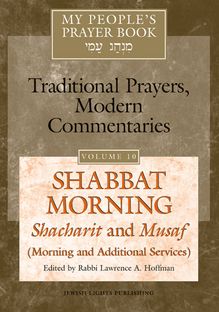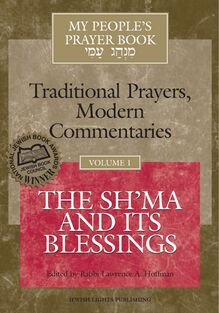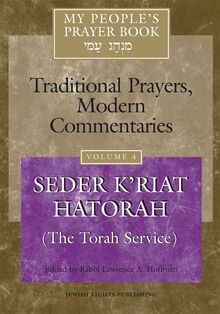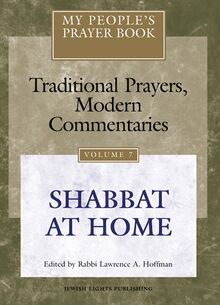My People's Prayer Book Vol 10 , livre ebook
180
pages
English
Ebooks
2013
Vous pourrez modifier la taille du texte de cet ouvrage
Obtenez un accès à la bibliothèque pour le consulter en ligne En savoir plus
Découvre YouScribe en t'inscrivant gratuitement
Découvre YouScribe en t'inscrivant gratuitement
180
pages
English
Ebooks
2013
Vous pourrez modifier la taille du texte de cet ouvrage
Obtenez un accès à la bibliothèque pour le consulter en ligne En savoir plus
Publié par
Date de parution
27 juin 2013
Nombre de lectures
1
EAN13
9781580237642
Langue
English
Opens up the traditional Jewish prayer book as a spiritual resource....This groundbreaking new series involves us in a personal dialogue with God, history and tradition, through the heritage of prayer. "The prayer book is our Jewish diary of the centuries, a collection of prayers composed by generations of those who came before us, as they endeavored to express the meaning of their lives and their relationship to God. The prayer book is the essence of the Jewish soul." This stunning work, an empowering entryway to the spiritual revival of our times, enables all of us to claim our connection to the heritage of the traditional Jewish prayer book. It helps rejuvenate Jewish worship in today's world, and makes its power accessible to all. Vol. 10—Shabbat Morning: Shacharit and Musaf (Morning and Additional Services) features the authentic Hebrew text with a new translation that lets people know exactly what the prayers say. Introductions explain what to look for in the prayers, and how to truly use the commentaries to find meaning in the prayer book. Framed with beautifully designed Talmud-style pages, commentaries from many of today's most respected Jewish scholars from all movements of Judaism examine Shacharit and Musaf from the perspectives of ancient Rabbis and modern theologians, as well as feminist, halakhic, Talmudic, linguistic, biblical, Chasidic, mystical, and historical perspectives.
ABOUT MY PEOPLE'S PRAYER BOOK INTRODUCTION TO THE LITURGY: SHABBAT MORNING Lawrence A. Hoffman FROM AMIDAH TO AMIDAH: THE FLOW OF SHABBAT TIME Gordon Tucker INTRODUCTION TO THE COMMENTARIES: HOW TO LOOK FOR MEANING IN THE PRAYERS Lawrence A. Hoffman THE LITURGY 1. SHACHARIT ("MORNING SERVICE") A. P’SUKEI D’ZIMRAH (“VERSES OF SONG”): MORNING “WARM-UP” PRAYERS I. PSALM 136 II. BIRKAT HASHIR (“THE BLESSING OF SONG”): CLOSING BLESSING FOR P’SUKEI D’ZIMRAH A. NISHMAT KOL CHA’I (“THE BREATH OF EVERY LIVING BEING”) B. YISHTABACH (“LET [YOUR NAME] BE PRAISED”) B. SH’MA UVIRKHOTEHA (“THE SH’MA AND ITS BLESSINGS”): TALKING ABOUT GOD 69 I. THE YOTSER (“BLESSING ON CREATION”) A. HAKOL YODUKHA (“ALL WILL GRATEFULLY ACKNOWLEDGE YOU”) B. EL ADON (“GOD, MASTER [OF ALL CREATION]”) C. LA’EL ASHER SHAVAT (“TO GOD WHO RESTED”) C. THE AMIDAH (“STANDING” PRAYER): TALKING TO GOD I. K’DUSHAT HASHEM (“SANCTIFICATION OF [GOD’S] NAME”): DECLARING GOD’S HOLINESS II. K’DUSHAT HAYOM (“SANCTIFICATION OF THE DAY”): DECLARING SABBATH HOLINESS 2. MUSAF (“ADDITIONAL SERVICE”) A. THE AMIDAH (“STANDING” PRAYER): TALKING TO GOD I. K’DUSHAT HASHEM (“SANCTIFICATION OF [GOD’S] NAME”): DECLARING GOD’S HOLINESS II. K’DUSHAT HAYOM (“SANCTIFICATION OF THE DAY”): DECLARING SABBATH HOLINESS III. K’DUSHAT HAYOM (“SANCTIFICATION OF THE DAY”): IF SHABBAT FALLS ON ROSH CHODESH (THE NEW MOON) 3. CONCLUDING PRAYERS A. EIN KELOHEINU (“THERE IS NONE LIKE OUR GOD”) B. LIST OF LEVITICAL PSALMS AND LESSONS ON STUDY AND PEACE I. LIST OF LEVITICAL PSALMS II. LESSONS ON STUDY AND PEACE C. SHIR HAKAVOD (“SONG OF GLORY”) About the Contributors List of Abbreviations Glossary
Publié par
Date de parution
27 juin 2013
Nombre de lectures
1
EAN13
9781580237642
Langue
English
R ead may be the wrong word. Engage would be better, because this is not so much a book as it is a classic text, and Jewish classics are not read so much as they are engaged. Included here is a classic text of Jewish prayer, spanning 2,000 years of Jewish experience with the world and with God; and nine thoughtful commentaries on that text, each one reaching back in a different way, again through 2,000 years of time. The question ought to be, Who should engage this book in personal dialogue?
If you like to pray, or find prayer services baffling: Whether you are Orthodox, Conservative, Reconstructionist, or Reform, you will find that My People s Prayer Book tells you what you need to know to pray. The Hebrew text here is the most authentic one we have, and the variations among the Jewish movements are described and explained. They are all treated as equally authentic. The translation is honest, altogether unique, and outfitted with notes comparing it to others translations. Of special interest is a full description of the Halakhah (the how to ) of prayer and the philosophy behind it.
If you are a spiritual seeker or Jewishly curious: If you have wondered what Judaism is all about, the prayer book is the place to begin. It is the one and only book that Jews read each and every day. The commentaries explain how the prayers were born, and synopsize insights of founding Rabbis, medieval authorities, Chasidic masters, and modern theologians. The layout replicates the look of Jewish classics: a text surrounded by many marginal commentaries allowing you to skip back and forth across centuries of insight.
If you are a teacher or a student: This is a perfect book for adult studies, or for youth groups, teenagers, and camps. Any single page provides comparative insight from the length and breadth of Jewish tradition, about the texts that have mattered most in the daily life of the Jewish people.
If you are a scholar: Though written in friendly prose, this book is composed by scholars: professors of Bible, Rabbinics, Medieval Studies, Liturgy, Theology, Linguistics, Jewish Law, Mysticism, and Modern Jewish Thought. No other work summarizes current wisdom on Jewish prayer, drawn from so many disciplines.
If you are not Jewish: You need not be Jewish to understand this book. It provides access for everyone to the Jewish wisdom tradition. It chronicles the ongoing Jewish-Christian dialogue, and the roots of Christian prayer in Christianity s Jewish origins.
The My People s Prayer Book: Traditional Prayers, Modern Commentaries series Volume 1- The Sh ma and Its Blessings 168 pp, 978-1-879045-79-8 Volume 2- The Amidah 240 pp, 978-1-879045-80-4 Volume 3- P sukei D zimrah (Morning Psalms) 240 pp, 978-1-879045-81-1 Volume 4- Seder K riat Hatorah (The Torah Service) 264 pp, 978-1-879045-82-8 Volume 5- Birkhot Hashachar (Morning Blessings) 240 pp, 978-1-879045-83-5 Volume 6- Tachanun and Concluding Prayers 240 pp, 978-1-879045-84-2 Volume 7- Shabbat at Home 240 pp, 978-1-879045-85-9 Volume 8- Kabbalat Shabbat (Welcoming Shabbat in the Synagogue) 240 pp, 978-1-58023-121-3 Volume 9- Welcoming the Night: Minchah and Ma ariv (Afternoon and Evening Prayer) 272 pp, 978-1-58023-262-3 Volume 10- Shabbat Morning: Shacharit and Musaf (Morning and Additional Services) 240 pp, 978-1-58023-240-1
Prayers of Awe Volume 1- Who by Fire, Who by Water- Un taneh Tokef 272 pp, 978-1-58023-424-5 Volume 2- All These Vows- Kol Nidre 288 pp, 978-1-58023-430-6 Volume 3- We Have Sinned:Sin and Confession in Judaism- Ashamnu and Al Chet 288 pp, 978-1-58023-612-6 Volume 4- May God Remember: Memory and Memorializing in Judaism- Yizkor 250 pp (est), 978-1-58023-689-8
My People s Passover Haggadah: Traditional Texts, Modern Commentaries Volume 1- 304 pp, 978-1-58023-354-5 Volume 2- 320 pp, 978-1-58023-346-0
Thank you for purchasing this Jewish Lights e-book!
Sign up for our e-newsletter to receive special offers and information on the latest new books and other great e-books from Jewish Lights.
Sign Up Here
or visit us online to sign up at www.jewishlights.com .
Looking for an inspirational speaker for an upcoming event, Shabbaton or retreat?
Jewish Lights authors are available to speak and teach on a variety of topics that educate and inspire. For more information about our authors who are available to speak to your group, visit www.jewishlights.com/page/category/JLSB . To book an event, contact the Jewish Lights Speakers Bureau at publicity@jewishlights.com or call us at (802) 457-4000.
INTRODUCTION TO THE LITURGY: SHABBAT MORNING
Lawrence A. Hoffman
FROM AMIDAH TO AMIDAH : THE FLOW OF SHABBAT TIME
Gordon Tucker
INTRODUCTION TO THE COMMENTARIES: HOW TO LOOK FOR MEANING IN THE PRAYERS
Lawrence A. Hoffman
THE LITURGY
1. SHACHARIT ( MORNING SERVICE )
A. P SUKEI D ZIMRAH ( VERSES OF SONG ): MORNING WARM-UP PRAYERS
I. PSALM 136
II. BIRKAT HASHIR ( THE BLESSING OF SONG ): CLOSING BLESSING FOR P SUKEI D ZIMRAH
A. NISHMAT KOL CHA I ( THE BREATH OF EVERY LIVING BEING )
B. YISHTABACH ( LET [YOUR NAME] BE PRAISED )
B. SH MA UVIRKHOTEHA ( THE SH MA AND ITS BLESSINGS ): TALKING ABOUT GOD
I. THE YOTSER ( BLESSING ON CREATION )
A. HAKOL YODUKHA ( ALL WILL GRATEFULLY ACKNOWLEDGE YOU )
B. EL ADON ( GOD, MASTER [OF ALL CREATION] )
C. LA EL ASHER SHAVAT ( TO GOD WHO RESTED )
C. THE AMIDAH ( STANDING PRAYER): TALKING TO GOD
I. K DUSHAT HASHEM ( SANCTIFICATION OF [GOD S] NAME ): DECLARING GOD S HOLINESS
II. K DUSHAT HAYOM ( SANCTIFICATION OF THE DAY ): DECLARING SABBATH HOLINESS
2. MUSAF ( ADDITIONAL SERVICE )
A. THE AMIDAH ( STANDING PRAYER): TALKING TO GOD
I. K DUSHAT HASHEM ( SANCTIFICATION OF [GOD S] NAME ): DECLARING GOD S HOLINESS
II. K DUSHAT HAYOM ( SANCTIFICATION OF THE DAY ): DECLARING SABBATH HOLINESS
III. K DUSHAT HAYOM ( SANCTIFICATION OF THE DAY ): IF SHABBAT FALLS ON ROSH CHODESH (THE NEW MOON)
3. CONCLUDING PRAYERS
A. EIN KELOHEINU ( THERE IS NONE LIKE OUR GOD )
B. LIST OF LEVITICAL PSALMS AND LESSONS ON STUDY AND PEACE
I.LIST OF LEVITICAL PSALMS
II.LESSONS ON STUDY AND PEACE
C. SHIR HAKAVOD ( SONG OF GLORY )
About the Contributors
List of Abbreviations
Glossary
About the Editor
About My People s Prayer Book
Copyright
Also Available
About Jewish Lights
Sign Up for E-mail Updates
Send Us Your Feedback
CONTRIBUTORS
MARC BRETTLER: Our Biblical Heritage
ELLIOT N. DORFF: Theological Reflections
DAVID ELLENSON: How the Modern Prayer Book Evolved
ELLEN FRANKEL: A Woman s Voice
ALYSSA GRAY: Our Talmudic Heritage
JOEL M. HOFFMAN: What the Prayers Really Say
LAWRENCE A. HOFFMAN: History of the Liturgy
LAWRENCE KUSHNER AND NEHEMIA POLEN: Chasidic and Mystical Perspectives
DANIEL LANDES: The Halakhah of Prayer
IVAN G. MARCUS: Medieval Piety
GORDON TUCKER: Sacred Calendar
Shabbat Morning
Lawrence A. Hoffman
We see our landscapes differently depending on whether we travel by ship, plane, or car; or if we are just going for a walk. One if by land; two if by sea, goes the old American tale about Paul Revere, a lasting remnant of Henry Wadsworth Longfellow s poem Paul Revere s Ride . We can only imagine the different view of the American colonies that British troops occasioned because they arrived one way rather than another.
Everyone knows how important it is to plot journeys according to just the right route through space, but the time of our approach is no less consequential. Nights are magical, a time for romance, or, perhaps, as Shakespeare tells us, a witching time when churchyards yawn and hell itself breathes out Contagion. Mornings, by contrast, dawn bright with promise. In the morning of the world, says Robert Browning, Earth was nigher heaven than now. Job too recalls mornings as the time when stars sang together, and all the sons of God shouted for joy. Especially for Jews, the route through time is what matters.
Abraham Joshua Heschel famously noted that Judaism actually prefers carving out meaning in time rather than in space. Jewish ritual becomes our architecture in time, where Shabbat is our great cathedral. Think of Shabbat, then, as the destination of a weekly pilgrimage that will be seen differently, depending on our approach. To be sure, once in a while we are pilgrims in space, gifted with an opportunity to visit Eretz Yisrael, the spatial epicenter of our history and our People. But every week, here at home, wherever home may be, we revisit our Shabbat cathedral, and the timing of our approach matters deeply. As Gordon Tucker explains in From Amidah to Amidah : The Flow of Shabbat Time (pp. 12-15), the view from Friday night is not the same as the approach from Saturday morning and afternoon. The sacred architecture of Shabbat allows for many vantage points.
This volume of My People s Prayer Book analyzes Shabbat by day, the liturgical blueprint for the historic observance of Shabbat morning. Jews who arrived here from central Europe in the nineteenth century very largely made their living as merchants-many cities still bear mostly Jewish names over faded downtown storefronts. Blue laws forced the closing of their shops on Sunday, so Saturday became a shopping day they felt they could not abandon. Friday night became their most significant approach to Shabbat s sanctuary in time. This Friday night innovation was true for almost all Jews, regardless of denomination, and still remains the case, especially for Reform synagogues that trace their heritage to that central European migration. But Orthodox, Reconstructionist, and Conservative Jews have largely reverted to the centrality of Saturday morning, and increasingly, Reform Jews too, nowadays, underscore the celebration of Shabbat by day. If Shabbat is a cathedral in time, its liturgical architecture







